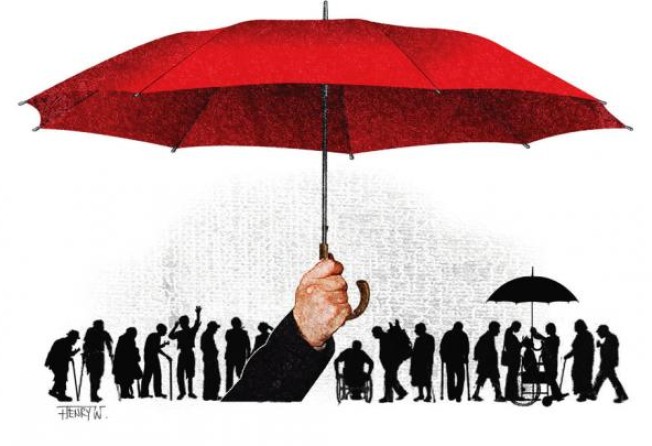How far should government intervention go to reduce poverty?
Christine Fang says the old-age allowance debate touches on the larger issue of the role of government: are we ready for stronger anti-poverty measures, such as a pension for all?

The Old Age Living Allowance comes out of good intentions - the new government wants to do something to help our elderly living in poverty. But the means-testing of recipients has aroused fierce opposition, and the asset limit has also been criticised for being too low, thus screening out the deserving poor.
The debate has not ended. This controversy goes beyond politicking, and touches on the deep-seated issues of government intervention in the redistribution of society's resources. Should assistance be universal or just targeted at those in dire need?
We all know that poverty among the elderly is serious and will worsen because we do not have adequate retirement protection for old age. In Hong Kong, we have 12 years of free and compulsory education for all school-aged children and a heavily subsidised public health-care system serving all citizens with a Hong Kong identity card. These are universal social benefits to which even the rich are entitled. So why shouldn't retirement protection be universal?
The non-governmental sector has been advocating government intervention in universal pension protection for years. This idea has been mocked by people who favour lower taxes and prefer to keep the money in their own pockets, with minimum government meddling in their lives.
At issue are our values as a society. We've long held the idea that it is the individual's responsibility to prepare for old age, if not the children's responsibility to support their aged parents, and the government steps in only when the line of defence fails.
What is the role and responsibility of government versus that of the individual and family? The government redistributes wealth through the tax system. It also sets rules like the minimum wage to ensure economic gains are shared. If people did indeed benefit from the trickle-down effects of economic growth, their livelihoods, including those of the poor, would improve. But this is not the case. Our per capita gross domestic product rose to about HK$264,000 in 2011, while an estimated 1.15 million people were living in poverty. This is obviously a market failure. Many people simply cannot make a decent living and support their parents, even with a job.
The government needs to step in. Access to public housing, welfare and health care are essential programmes for poverty mitigation. Yet the poverty problem has not improved and has even worsened, especially for elderly people who have not benefited from the improved economy and minimum wage measures.
The issue now is, are we ready for more proactive anti-poverty measures, following what other governments have done in the setting up of social insurance or central provident funds, to help citizens to pool risks and protect themselves against sickness, unemployment and old age?
The number of our elderly poor is growing. We should have a universal pension system that offers adequate and dignified protection for all elderly and which is financially sustainable.
This administration has been sending clear signals that it is moving towards a role involving more intervention than previous governments in tackling the long-standing problem of poverty. A new Commission on Poverty is being set up and one of its tasks will be to draw up an objective poverty line. This is a significant first step, demonstrating the government's commitment and accountability to fight poverty.
To do this job well requires vision and courage. To start with, the government has to address the concerns underlying the apparent criticism of the Old Age Living Allowance. People look to the government for a long-term solution for financial protection when they get old and have no more earning capacity. Most are ready to share responsibilities and help the disadvantaged.
Yet the community should have a say in whether the security of basic livelihood in old age is a problem of elderly poverty or a civic rights issue. People should have a say in what is adequate basic livelihood, because all have a stake in it.
Poverty reduction is complex and much more than just giving alms and feeding the poor.
The community is receptive to government intervention, if it means the government takes proactive measures to correct the social disequilibrium, but they need to be assured that the system being proposed is fair, rational and effective. Public consultation and participation are crucial to building solidarity and consensus, to bringing together divergent views, and to finding solutions that are sustainable.
The government should lay out the goals and strategies in the fight against poverty for the coming five years. It needs to engage all sectors, civil society organisations, community leaders and politicians to find solutions from the bottom up to alleviate and reduce poverty. This is a test of leadership and governance.
Christine Fang Meng-sang is chief executive of the Hong Kong Council of Social Service